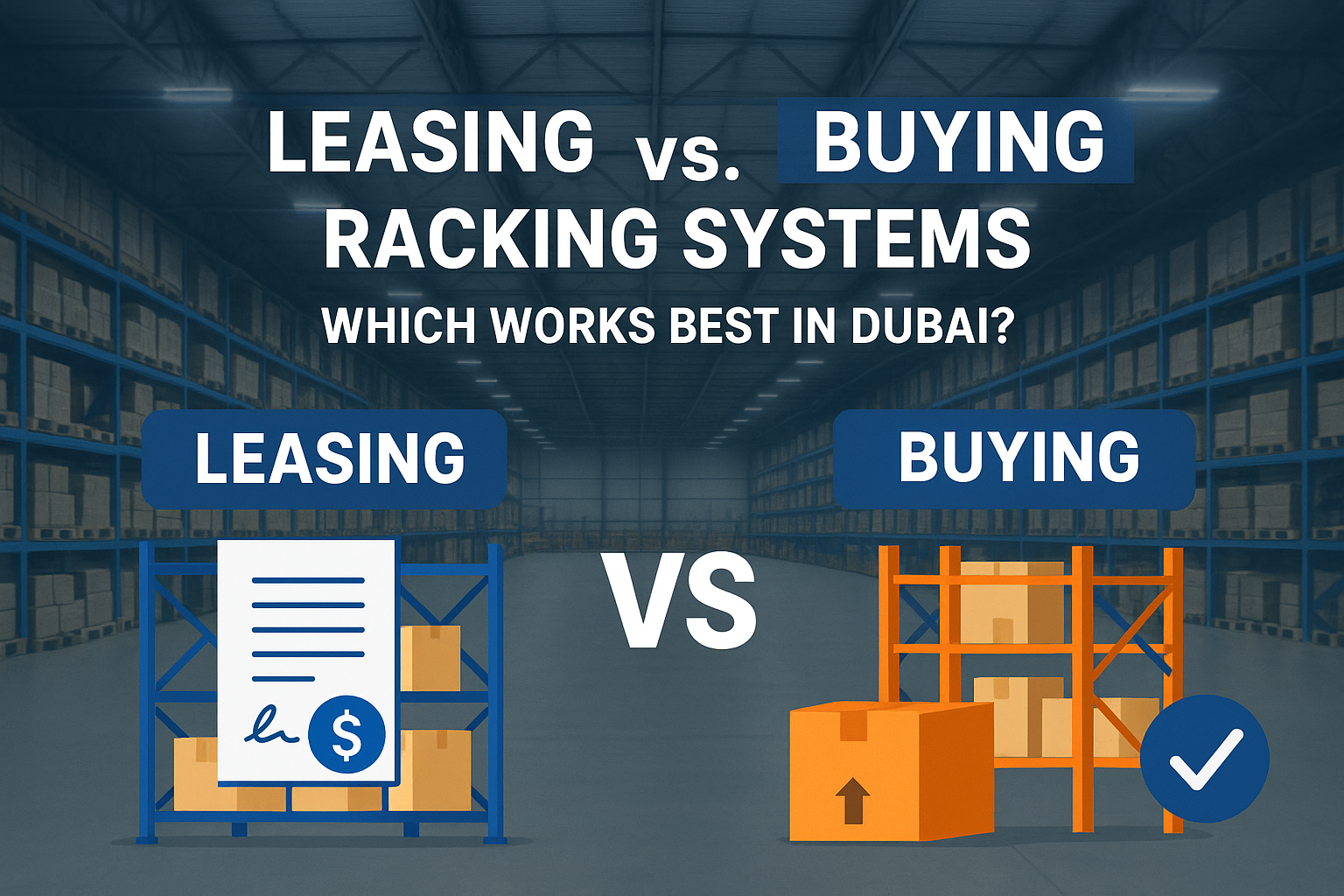
Dubai has rapidly established itself as a global logistics and trade hub, attracting businesses that rely heavily on efficient warehousing solutions. With the city’s exponential growth in e-commerce, import-export trade, and cold storage, warehouse owners and operators must decide how best to invest in their racking systems.
The big question remains: Should businesses lease racking systems or purchase them outright?
In this article, we’ll explore the pros and cons of leasing versus buying racking systems in Dubai, analyzing costs, flexibility, and return on investment (ROI). Whether you are a startup, SME, or a multinational corporation, understanding this decision could directly impact your operational efficiency and profitability.
The Dubai Warehouse Market Landscape
Dubai’s warehousing sector is evolving rapidly due to:
- Booming e-commerce growth: Platforms like Amazon, Noon, and Carrefour require large-scale storage solutions.
- Cold chain demand: Pharmaceuticals, groceries, and perishable goods need specialized racking systems.
- Free zones & global trade: Jebel Ali Free Zone (JAFZA) and Dubai South have created immense opportunities for logistics businesses.
With rising competition and real estate costs, warehouse operators must strategically allocate capital. The choice between leasing and buying racking systems has never been more critical.
Leasing Racking Systems in Dubai
Leasing is increasingly popular for companies seeking low upfront costs and flexibility.
Advantages of Leasing
- Lower Initial Investment
Leasing eliminates the need for heavy upfront capital expenditure, freeing up resources for other operational expenses. - Flexibility & Scalability
Businesses can adjust their racking systems as warehouse requirements change—ideal for seasonal operations and growing e-commerce businesses. - Maintenance & Upgrades
Many leasing agreements include maintenance, reducing downtime and ensuring racks are compliant with Dubai’s safety standards. - Tax & Accounting Benefits
Leasing expenses are often tax-deductible, which can improve financial statements and balance sheets.
Challenges of Leasing
- Long-Term Costs: Over time, leasing may become more expensive than outright ownership.
- Limited Customization: Some leased racks may not be tailor-made for highly specialized industries like cold storage.
- Contractual Obligations: Lease terms may lock businesses into agreements that aren’t easily adjusted.
Buying Racking Systems in Dubai
Purchasing racks outright remains the preferred option for established businesses with long-term stability.
Advantages of Buying
- Ownership & Asset Value
Racks become assets that add value to the warehouse and can even increase resale property worth. - Customization
Businesses can design racks to meet exact specifications, whether it’s pallet racking, drive-in racks, or mezzanine systems. - Long-Term ROI
While upfront costs are high, ownership ensures cost savings over the years compared to continuous lease payments. - No Lease Restrictions
Businesses can use racks without worrying about contracts, damages, or penalties.
Challenges of Buying
- High Upfront Capital: Requires significant investment, which may not be ideal for startups or small businesses.
- Maintenance Costs: Businesses are responsible for ongoing inspections, safety checks, and repairs.
- Lack of Flexibility: If warehouse requirements change, purchased racks may become obsolete.
Comparing Leasing vs Buying Racking Systems in Dubai
| Factor | Leasing Racking Systems | Buying Racking Systems |
|---|---|---|
| Initial Investment | Low | High |
| Flexibility | High (can scale easily) | Low (fixed investment) |
| Customization | Limited | Full customization |
| Maintenance | Often included | Business responsibility |
| ROI | Short-term friendly | Long-term profitability |
| Best for | Startups, SMEs, seasonal operators | Large warehouses, long-term stability |
ROI Considerations in Dubai
- Startups & SMEs: Leasing offers breathing room to manage cash flow.
- Multinationals & Long-Term Players: Buying racks ensures stability, better customization, and stronger long-term ROI.
- Seasonal Industries (e.g., retail, FMCG): Leasing provides the agility to expand or reduce warehouse space quickly.
Factors to Consider Before Deciding
- Warehouse Size & Growth Forecast
- Available Capital & Financing Options
- Industry Requirements (cold storage, heavy-duty, e-commerce, etc.)
- Lease Terms & Contract Flexibility
- Maintenance & Safety Compliance in UAE
The choice between leasing and buying racking systems in Dubai depends largely on business size, industry type, and long-term strategy. Leasing offers flexibility and lower upfront costs, making it ideal for startups and SMEs. Buying, on the other hand, delivers long-term ROI and complete customization, making it better suited for established logistics operators and large-scale warehouses.
At the end of the day, businesses must weigh their capital resources, growth trajectory, and operational needs before making the final decision.
FAQs
1. Is racking lease in Dubai cheaper than buying?
Leasing is cheaper upfront, but in the long run, ownership can provide better ROI for stable businesses.
2. Can I customize leased racking systems in Dubai?
Most leases have limited customization, but some providers offer modular racks suitable for various industries.
3. Are leased racks maintained by the provider?
Yes, many leasing agreements in Dubai include maintenance, which reduces operational risk.
4. How long are racking lease contracts in Dubai?
Contracts typically range from 1–5 years, depending on the provider and warehouse requirements.
5. Which industries benefit most from leasing racks?
E-commerce, FMCG, and seasonal retail businesses benefit most from the flexibility of leasing.
6. What safety standards apply to racking systems in Dubai?
Racking systems must comply with Dubai Municipality safety regulations and international standards such as ISO and FEM.